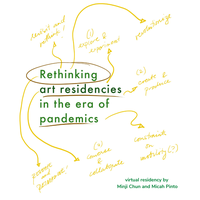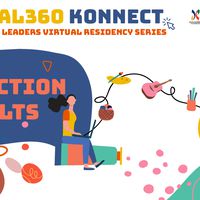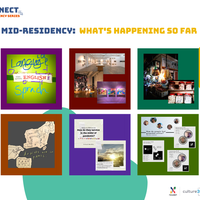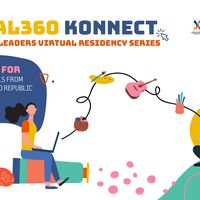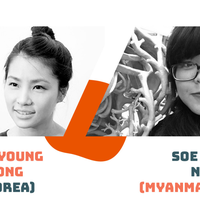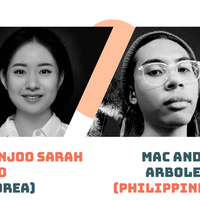Virtual360 Konnect | Field Notes: Reflections on Virtual360 Konnect
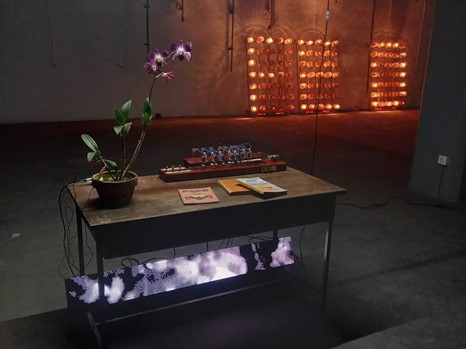
Art installation by Bagus Pandega (Courtesy: Dian Arumningtyas)
Throughout the one-month residency of Virtual360 Konnect – Emerging Arts Leaders Residency Series, Dian Arumningtyas from Indonesia & Kim Gahye from Korea collaborated on ‘The Weekly Struggles’ and learnt how managing an online platform in the context of a virtual residency project laid out different challenges and excitements.
Initially, we started The Weekly Struggles to expose art practitioners’ challenges and obstacles to provide a space for dialogue by proposing what each individual or organisation might need from others. The project became an embodiment of our own daily life—on navigating and rewiring the purpose of our practice in the art ecosystem. This field note consists of two parts, first is each of our reflections and second part is our collective reflections post residency.

Skill of Rest & Relaxation by Jayi Kim (Courtesy of Kim Gahye)
Kim Ga-hye's long-term project, Indiana Jones, is an explorer project that seeks Indonesian art, just like the story of Indiana Jones, where the main character seeks ancient treasures. Since 2016, the project has been self-sustaining, facilitating international exchanges in the art space, and connecting audiences through travel, lectures, and independent publishing. Currently, they are preparing to launch an art service for artists and audiences.
Gwangju was where Kim Ga-hye met a fellow artist who did not tolerate the rudeness of others but delivered her opinion clearly. In particular, the direction and motivation of the project could be specified in the process of social learning. Recognising the narrow-mindedness of the local art community, she continues to stay in the region and gather more diverse eyes to continue their story. Through the project, she is inspired by audiences and artists, and strives to connect with their daily lives.
In collecting data for The Weekly Struggles, Dian observed that a lot of her fellow art practitioners came up with various activities to cope and keep up with the sudden changes. Planting and gardening, podcasting, baking, sewing, re-working unfinished artwork, and strategising how to utilise the limitations brought by the pandemic in a more productive way.
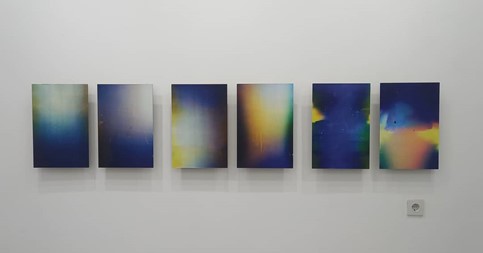
Artwork by Aulia Ibrahim Yeru on his solo exhibition “Vial” (Courtesy: Dian Arumningtyas)
Together, we took notes of some of the process of this virtual residency program, that we elaborate below:
On Valuing Interactions and Conversing Languages
“Interaction” is indeed a valuable commodity in any kind of project that involves exchange. Though both of us have known for some time, virtual interactions could not replace the physical, face-to-face interactions. To put it in a framework of a residency program—especially online-based, we thought to ourselves, “Who is our audience? Are we expected to create a new audience through an Instagram account presence? Who are we talking to and what is the suitable language to have a dialogue with them?”
On “Occupying” an Empty Space
We started The Weekly Struggles by creating an Instagram account, later posting pictures on the vacant, newly established internet entity. Occupying a virtual space did not resonate the same vibe as physical space, and it brought us to question, “what kind of residing do virtual residencies offer?” since what we did might not differ much to other accounts—especially those that focus on disseminating information, like mass media or online news portals.
Though a virtual residency taking over an Instagram account is not a new thing, we remembered how the rise of the account’s follower base can become a success indicator of the program, just like the experience of LACMA in 2017. If so, then does internet popularity become essential to the art practitioner’s praxis?
On Perception of Time
Time seems to be limitless when we are online. We can always “visit” and “participate” in an art event in London while we are in Southeast Asia. We get to know other art practitioners through the chain of information that somehow reaches us despite the internet algorithm featured in most social media platforms. These infinite possibilities and opportunities do bring positive impact to the art ecosystems, yet somehow it becomes an illusion and the world spins faster where we cannot keep up.
On Borders and Transnationalism
What has gone since everything suddenly went online due the pandemic? Perhaps, it is the sense of borders. What ties or anchors us to a certain “identity”, are perhaps our nationality and cultural backgrounds. Our passport used to be the key to access mobility and physical relocation. Now, borders seem to shift from tangible to intangible boundaries, for example time zones. In choosing schedules when organizing a virtual event, questions usually revolve around “if we organize this event at 8 pm in GMT+7, would audiences in GMT+11 be able to livestream it?”
In that sense, we can only reach out to the audience living in different time zones as far as 12 hours ahead, or 12 hours behind at the maximum. This new sense of border does bring up an alternative proposition: regional partnerships are more feasible and make more sense to organise.
Conclusion
The Weekly Struggles turned out differently than what we had hoped it to be. We realized that some things take time or with better preparation. The question remains: how can we make this initiative more sustainable, especially in our online presence, both on Instagram and on The Weekly Struggles’ website.
This article was written from 36.90.3.240.
The Weekly Struggles is still accessible on https://instagram.com/theweeklystruggles or website https://www.theweeklystruggles.club.
Further reading
https://unframed.lacma.org/2017/07/05/announcing-lacma%E2%80%99s-first-instagram-artist-residence
https://news.artnet.com/art-world/digital-residencies-1144373
This article is part of a series of articles written by the participants of Virtual360 Konnect - Emerging Arts Leaders Virtual Residency Series, an online cultural exchange and capacity building initiative developed by the Asia-Europe Foundation (ASEF) and the ASEAN Foundation through KONNECT ASEAN. Over a period of one month, 20 emerging art leaders from Korea and 5 countries of the ASEAN region (Brunei Darussalam, Indonesia, Malaysia, Myanmar, Philippines and Singapore) collaborated in pairs on the theme of international cultural exchange in the Covid-19 era.

